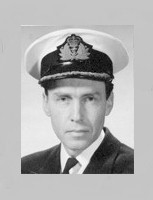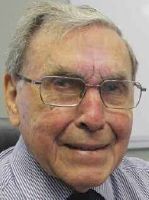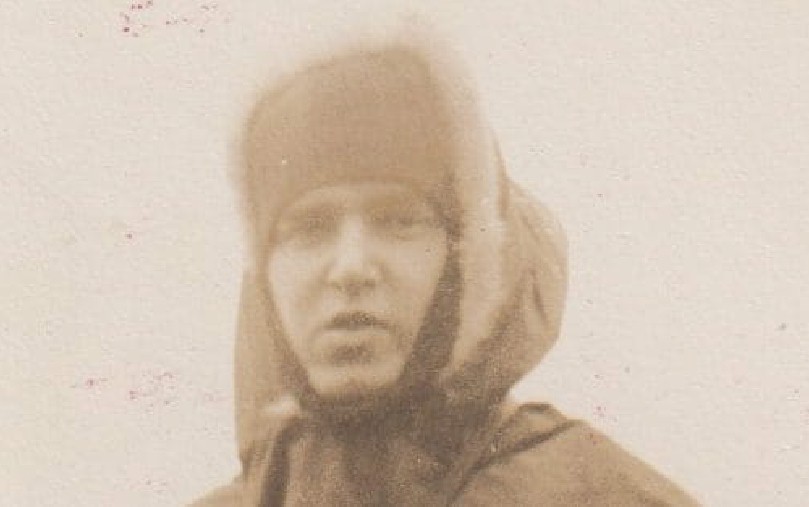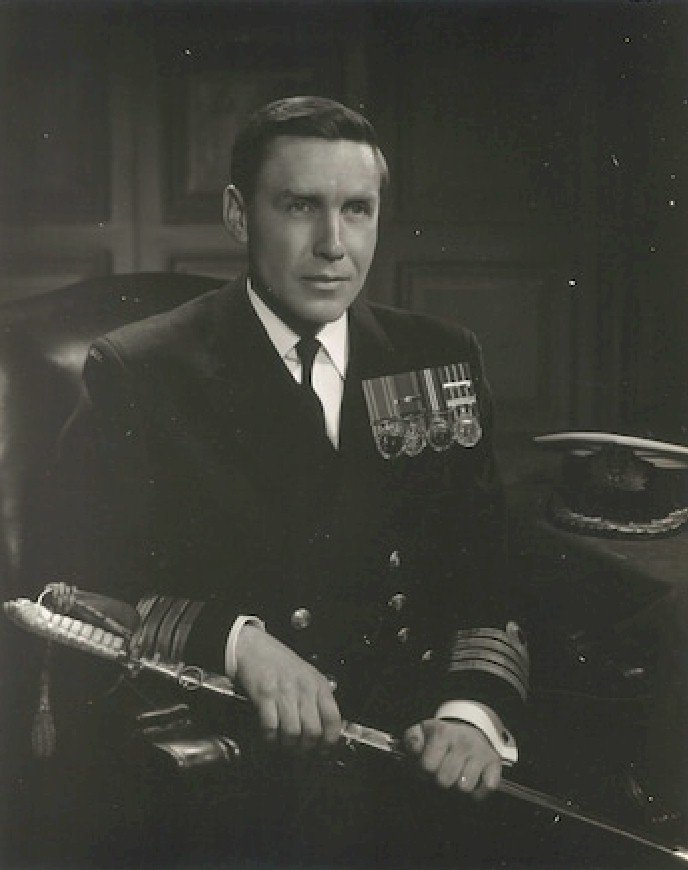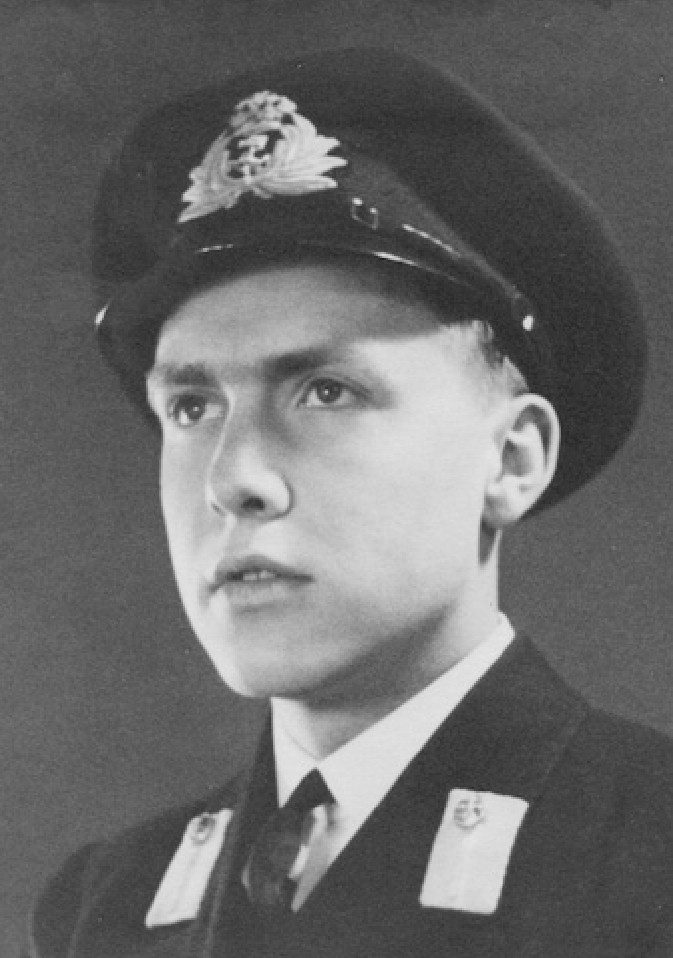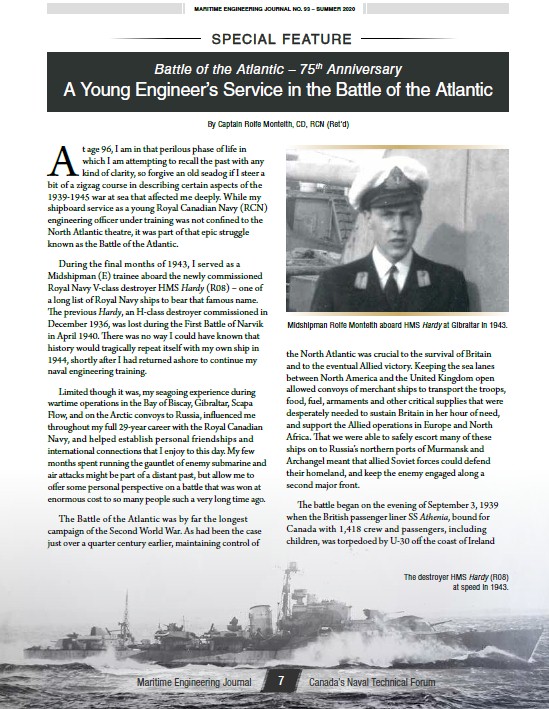|
In memory of those who have Crossed the Bar
Dear All, With a heavy heart I write to tell you that our remarkable Canadian friend Captain Rolfe Monteith RCN crossed the bar on Tuesday 22nd July this week, 2025. Rolfe was a most remarkable man, a Naval engineer by training he served in the RN during WWII before returning the Canada for a career in the RCN, on retirement he joined the British Engineering group Babcock. Rolfe settled in Great Britain living first in Plymouth before moving the Wales and then back to Plymouth. His funeral will be in Mid-August to allow for family and friends in Canada time to organise. I hope that we may be able to arrange for the display at his funeral of the White Ensign and the Maple Leaf, Rolfe was a great friend of HMS Belfast and a regular attendee of our functions, attached is a clip (HMS Belfast VE Day 2018 Sunset) of one of our VE Day events onboard, appropriately, Sunset, attended by some 60 veterans a few years ago when they still had their mobility. Rolfe is it the rear right with an arm round a former WWII sailor for the Russian Northern Fleet, they were both Arctic convoy survivors. Back then we had three or four Canadian veterans, Rolfe was the last man standing of this group. From Tim Lewin, UK
Captain Rolfe Gibson Monteith RCN, 30 October 1923 - 22 July 2025
Naval cadet Rolfe Monteith was not even in uniform when he first brushed with action during the Second World War. Having just matriculated from high school, the 17-year-old Canadian had volunteered to train in the Royal Navy (RN) as an officer and ship's engineer in the United Kingdom. His passage across the North Atlantic from Halifax, Nova Scotia, to Liverpool aboard the armed merchant cruiser Laconia on convoy HX 147 during the late summer of 1941 proved eventful. He witnessed a submarine scare with depth charges being dropped, several attempts to chase away German submarines and observed the wreckage of convoy SC 42, which had been mauled by a German U-boat wolfpack. On this occasion the Laconia had been fortunate not to have been attacked; it was sunk just over a year later on 12 September 1942.
Midshipman (Engineer) Monteith's luck held when serving in the destroyer HMS Hardy(R08) on Arctic Convoy JW 54B in late 1943, which took him from Loch Ewe to Murmansk and back to Scapa Flow without major incident. Apart from sighting German reconnaissance aircraft from time to time, there was no trace of any U-boat activity. He had experienced, however, many of the trials of what has been described (and often attributed to Churchill) as the 'worst journey in the world' in the long freezing black nights of the Arctic, and a failed attempt to locate the German Battlecruiser Scharnhorst. While Monteith was bitter about having to return to Plymouth to complete his engineering course, his former shipmates in Hardy were soon to serve on another run to Russia. This time they were not so lucky as their destroyer was struck and sunk by a German GNAT acoustic torpedo fired by U-278, which blew off the stern section of the ship on 30 January 1944. Sadly 35 men were lost, many of which had become Monteith's close friends. Although not directly involved in this action, he never really got over this incident until a chance meeting at a naval reunion held at Loch Ewe in May 2017. There he was introduced to the son of one of the crewmen. Learning how Chief Petty Officer Electrical Artificer Fred Pearce, who had befriended and mentored him aboard Hardy, and others survived the sinking finally brought some closure.
Rolfe Gibson Monteith was born in Chatham, Ontario, on 30 October 1923, the second son of Mr. and Mrs. Harold Matthew Monteith. While his father worked for the Bank of Montreal, his mother, Frances Elizabeth Monteith (née Gill) was a traditional Canadian housewife. Rolfe's elder brother Gordon was born in Chatham in 1920; his younger brother Neville was born in Montreal in 1933. From 1934 the family lived in Clinton, Huron County, Ontario. Spending a good part of the annual summer holidays staying with his mother's parents at Charlottetown, the capital of Prince Edward Island, the North Atlantic made such a big impression on him that he resolved to go to sea from the age of eight. But it was not until the summer of 1941 that he was old enough to apply to join the Royal Canadian Navy (RCN). A talented ice hockey player, Monteith was keen to join the war effort as soon as he could. In Halifax he joined a group of 31 young Canadian volunteers destined to join the RN's Special Entry Course 55 at the Britannia Royal Naval College, Dartmouth, which formed just under a third of the entry.
At Dartmouth, Monteith worked and played hard, learning quickly under rigorous wartime instruction how to become a naval officer, making many lifelong friends in the process. He did well in both practical and theoretical examinations, passing with 'honours', and was congratulated for the manner in which he had taken command as the Leading Cadet during the course's final Sunday divisions. While he wished to transfer to the Executive Branch, for which he was qualified, and thus to go to sea as quickly as possible, the RCN required him to train as an engineer and to attend the Royal Naval Engineering College at Keyham, Plymouth. This commitment entailed over three years of study, equating to an undergraduate degree course. Hence Monteith spent most of the war ashore. Although academically challenging at times, the course was made bearable by the camaraderie, humour and teamwork among his classmates of the May 1942 Intake, twelve of which were Canadian and six were Polish. Apart from his four-month deployment in HMS Hardy, another highlight was attending a short commando course. He spent much of his leave periods travelling the length and breadth of Britain, getting to know the country and its people well.
Monteith met his future wife, Wren Peggy Kelly, in Plymouth. She had lost her brother Arthur, who had gone down in the aircraft carrier HMS Glorious, sunk by the Scharnhorst off Norway on 8 June 1940, along with its escorting destroyers Ardent and Acasta. After the war he joined the Glorious, Ardent and Acasta Association, dedicated to perpetuate the proud memory of the 1531 officers and men who lost their lives in this action. Lieutenant Rolfe Monteith married on 18 April 1945, celebrating VE Day on 8 May 1945 in Plymouth and VJ Day in London on 15 August 1945 along with fellow RCN engineers and their partners. Monteith journeyed home to Canada for the first time in over four years in September 1945. On returning to England, he went to sea for six months in November 1945 in the light cruiser HMS Diadem to earn his certificate of competence as a marine engineer.
Monteith returned to Canada in 1947 to serve in a variety of appointments in the RCN, designed to tap and broaden his experience as an engineer. He decided to specialise as an air engineer, a role that took him to support naval air squadrons both ashore and afloat. A particular highlight early on during his post-war career was serving as the engineering officer of the destroyer HMCS Sioux, a former sister ship to HMS Hardy, so he knew its equipment and machinery well. During a visit to the United Kingdom in June 1953,Monteith was privileged to attend the coronation of HM Queen Elizabeth II and to be present at the review of the fleet held at Spithead, events that reinforced his close connections with Britain, the Crown and the RN. Monteith flourished in the RCN as a highly respected engineer officer, being promoted to Lieutenant Commander, Commander and Captain in 1952, 1958 and 1964 respectively. Apart from serving as Director of Air Engineering and of Marine and Electrical Engineering in the RCN, perhaps his most challenging role came in 1964, when appointed as the project manager of the Hydrofoil Escort 400 programme. Although ultimately an unsuccessful design concept, work on the vessel not only raised Monteith's profile within the RCN, but also exposed him to the vicissitudes of naval procurement.
When attending the Imperial Defence College (now the Royal College of Defence Studies) in London in 1968, Monteith resolved to resign from the RCN and to reside in the United Kingdom. He had two further years to serve back in Canada, however, which meant he was not able to emigrate until late 1970. During the 1970s and 1980s he worked for the major British engineering companies Babcock and Wilcox and the Weir Group. On the strength of his very considerable naval and industrial experience he was appointed Chairman of the British Naval Equipment Association, a role which allowed him to retain close links to both the RN and RCN.
Monteith retired from business in 1990, giving him the time to travel widely and to organise a number of naval reunions, including the 50th anniversary of Special Entry 55 in 1991, followed by two further such events in 1995 and 2001. Following the death of Peggy Monteith in 1973, Monteith remained single until meeting Ann Penketh (née Discombe) in 1994, who became his partner in 1997. They moved to her house in Brockweir in the Wye Valley, Forest of Dean, marrying in 2013 shortly before she passed away. In late 2017 he returned to Plymouth, bringing him close to his elder son and family, who looked after him in his final years.
Until his late 90s, Monteith remained active, devoting considerable time to veterans' events, including marching regularly for many years past the Cenotaph in Whitehall on Remembrance Sunday, sporting proudly his British Arctic Star and Russian Ushakov Medal, and meeting friends new and old for a convivial lunch and a chat in various locations, not least at the Champagne Charlies wine bar in Charing Cross. In addition to researching the losses of HMS Glorious and HMS Hardy, he put together a privately-published memoir: the aptly titled Last Man Standing (2020), co-written with a senior military friend.
Rolfe
Monteith will be remembered as very much a 'people' person, a character of
warmth and charm, quick to engage with folk from all walks of life. Although
he had so many stories, both funny and serious, from his long and eventful
life to tell, he was also keen to discuss matters both topical and
historical with others, always having an 'agenda' to address. He will be
sadly missed as one of the very last Arctic Convoy veterans and of that very
special generation from across the British Commonwealth who served King and
country during the Second World War. He is survived by his two sons and his
younger brother. Written by Major-General Mungo Melvin
Captain Rolfe Monteith, Canadian teenage volunteer who survived the Arctic convoys
After four months at sea, he left the destroyer Hardy weeks before it was sunk, a loss that haunted him for years
Telegraph Obituaries 12 Aug 2025
Rolfe Monteith: volunteered for the Royal Canadian Navy aged 17
Captain Rolfe Monteith, of the Royal Canadian Navy, who has died aged 101, was one of the teenage Dominion volunteers who crossed the Atlantic to serve in the Second World War, and one of the last survivors of the wartime Arctic convoys.
Inspired by family holidays in Charlottetown on Prince Edward Island, young Monteith was eager to go to sea. In 1941, aged 17, he volunteered for the Royal Canadian Navy and soon found himself on his first Atlantic crossing - not yet in uniform - aboard the armed merchant cruiser Laconia with convoy HX 147. The voyage was perilous, passing through wreckage from convoy SC 42, which had recently been mauled by German U-boats off Greenland.
Among 31 Canadians in the Royal Navy's Special Entry Course No 55 at Britannia Royal Naval College, Dartmouth. He aspired to become a seaman officer, but was instead sent to the Royal Naval Engineering College at Keyham in Plymouth. There, in a class with 12 Canadians and four Poles, he began a rigorous three-year engineering course.
Part of his training included four months at sea, notably in the destroyer Hardy on Arctic Convoy JW 54B in November 1943, from Loch Ewe to Murmansk. The long Arctic nights shielded the convoy from enemy attacks but exposed the crew to freezing, treacherous seas.
Monteith cherished his time at sea and was deeply affected when he had to leave his shipmates to return to Plymouth. Hardy was sunk a few weeks later; it was a loss that haunted him for years, until a reunion in 2017 when he met the son of Chief Petty Officer Fred Pearce, a Hardy survivor who had been his mentor.
Rolfe Monteith was born in Chatham, Ontario, on October 30 1923, the second son of a Bank of Montreal employee. After the war ended, he briefly visited Canada for the first time in four years before returning to sea in the cruiser Diadem to complete his marine engineering qualifications in November 1945.
From 1947 he held a range of appointments, specialising as an air engineer. As engineer officer of HMCS Sioux in 1953, he attended Queen Elizabeth II's coronation and the subsequent fleet review at Spithead. He was director of air engineering in 1958-59 and engineering liaison officer with the Canadian joint staff in Washington from 1959 to 1962. While project manager for the Hydrofoil Escort 400 programme (1964-67), he also served for several months as director of marine and electrical engineering in 1965. Despite the hydrofoil's eventual failure, his work raised his profile, highlighting the challenges of naval procurement. While attending the Imperial Defence College in London in 1968, Monteith decided to resign from the RCN and settle in the UK. He spent the following decades working with leading British engineering firms, including Babcock and Wilcox and the Weir Group. His expertise led to his appointment as chairman of the British Naval Equipment Association, maintaining strong ties with both the RN and RCN.
Monteith as a 17-year-old midshipman
Retiring in 1990, Monteith travelled extensively and organised naval reunions, including the 50th anniversary of Special Entry 55 in 1991, and gatherings in 1995 and 2001. He remained active in veterans' circles well into his 90s, marching on Remembrance Sunday at the Cenotaph, proudly wearing both the British Arctic Star and Russian Ushakov Medal. He was equally at home sharing stories and debating history over lunch at Champagne Charlies in Charing Cross.
Monteith met his first wife, Peggy Kelly, a Wren, during the War; they married in 1945. Peggy had lost her brother aboard the aircraft carrier Glorious, and Monteith retained a lifelong interest in that tragedy.
After Peggy's death in 1973 he met Ann Penketh in 1994, moving to her home in Brockweir and marrying her in 2013; she also predeceased him. Monteith, remembered for his warmth, humour and ability to connect with people from all walks of life, is survived by two sons, one a former RN surgeon lieutenant, the other a lawyer.
Captain Rolfe Monteith, born October 30 1923, died July 22 2025
Ships served in: HMS HARDY R08 HMCS MAGNIFICENT - Appointed to MAGNIFICENT for 18 CAG as Air Engineer Officer HMCS SIOUX - Appointed to SIOUX in 1953 and Engineer Officer as a Lieutenant-Commander (E) (A/E)
Click on the above document to read the full article Credit: Maritime Engineering Journal No. 93 Summer 2020
|

